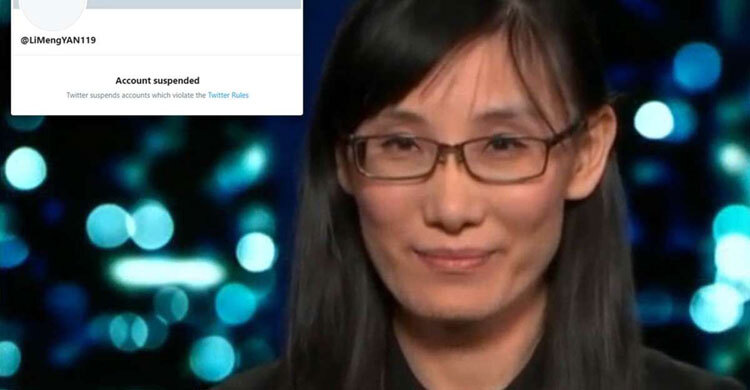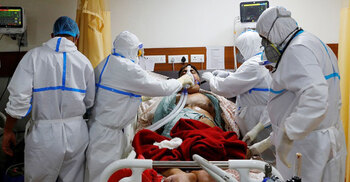Twitter suspends Chinese virologist who claims COVID-19 was lab-made

Twitter has suspended the account of a Chinese virologist who has publicly claimed that COVID-19 was developed in a Wuhan laboratory.
Li-Meng Yan's account was taken down on Tuesday after she accused China of intentionally manufacturing and releasing COVID-19, reports Daily Mail Online.
The Twitter account remained down on Wednesday and a message on the page now reads: 'Account suspended. Twitter suspends accounts which violate the Twitter Rules.'
Twitter has not commented on the suspension of Yan's account.
The social media giant started putting warning messages on tweets in May that contained disputed coronavirus claims.
It is not clear if there was one specific tweet from Yan that violated Twitter's policy.
In an interview with Fox News' Tucker Carlson on Tuesday night, Yan claimed she was suspended because 'they don't want the people to know this truth'.
Yan, who is a former researcher at the Hong Kong School of Public Health, said COVID-19 was 'man-made' and 'not from nature'.
'I have evidence to show why they can do it, what they have done, how (they did it),' she told Fox News.
'The scientific world also keeps silent... works together with the Chinese Communist Party, they don't want people to know his truth. That's why I get suspended, I get suppressed, I am the target that Chinese Communist Party wants disappeared.'
After the segment aired, the Fox News show also accused Facebook of censorship after saying they had been blocked from sharing the interview segment on the social media platform.
A video of the interview segment posted on the Tucker Carlson Tonight show's page now comes with a warning that reads: 'False Information. This post repeats information about COVID-19 that independent fact-checkers say is false.'
It comes as Yan published a report this week that she claims backs up her theory that China created the virus in a lab.
Some scientists have since said her report is 'unsubstantiated' and said it 'cannot be given any credibility'.
Yan's report has not been published in a scientific journal and has not been peer-reviewed - meaning it has not been checked and approved by fellow scientists.
Her report was posted on the website Zenodo.
The study was produced by the Rule of Law Society and the Rule of Law Foundation, sister organizations that former Trump strategist Steve Bannon founded with 50-year-old Chinese fugitive Guo Wengui.
Yan, who claims she fled to the US in April, says she was working at the Hong Kong School of Public Health - a reference laboratory for the World Health Organisation - before she was cut off after trying to alert people to human-to-human transmission of the virus in December.
The lab has denied that Yan ever 'conducted any research on human-to-human transmission' and said her assertions have 'no scientific basis'.
In her report released this week, Yan claims the virus was built by merging the genetic material of two bat coronaviruses.
She claims its spike protein - a structure on the surface of the virus which it uses to bind with cells - was edited to make it easier for the virus to latch on to human cells.
Other research papers have already determined the origin of the virus as bats, which has resulted in top experts dismissing suggestions the virus was created by humans.
Yan writes that her research discounts the theory that coronavirus evolved in the wild and was then transferred to humans, claiming it 'lacks substantial support'.
'SARS-CoV-2 shows biological characteristics that are inconsistent with a naturally occurring virus,' she wrote.
'The evidence shows that [the virus] should be a laboratory product created by using bat coronaviruses ZC45 and/or ZXC21 as a template and/or backbone.'
She alleges the virus 'should' have been built using stores of these bat viruses, of which she claims samples are kept in Hong Kong and China.
Yan also alleges that her work shows the virus could be built in just six months in the report's abstract but she does not return to the subject later in the paper.
Yan's claims are at odds with Dr Anthony Fauci, the director of the National Institute of Allergy and Infectious Diseases, who has previously disputed that the virus was made in a lab.
Dr Kristian Andersen, from the Scripps Research Institute in La Jolla, California, said the genetic material clearly pointed to a natural origin of the virus.
'There are lots of data and lots of evidence, as well as previous examples of this coming from nature,' he said.
'We have exactly zero evidence or data of this having any connection to a lab.'
Dr Angela Rasmussen, an infection and immunity expert at Columbia University, New York, said the site at which the virus binds to human cells has a 'sub-optimal' fit, suggesting it was not designed.
'Furthermore, there are no genetic similarities with other virus backbones used in any of the known (virus engineering systems),' she said.
'This suggest that this virus was not engineered.'
Yan wrote in her paper that theories the virus is from nature and the meat market in Wuhan are a 'smoke screen'. She alleges she was told this by CDC scientists working in China.
She has previously accused Beijing of lying about when it learned of the killer infection and engaging in an extensive cover-up.
US state officials have given momentum to the idea that COVID-19 either leaked from a lab or was man-made by China as some kind of weapon against humanity.
A Wuhan wet market was first thought to be the breeding ground of the virus, where the selling of live, wild animals would have given the perfect opportunity for it to naturally spread between species.
It is thought the virus first developed in bats before passing on to a creature such as a pangolin that then came into contact with humans and transmitted the virus.
Once it entered humans, the coronavirus is likely to have mutated to survive and then escalated out of control as a result of an unprepared population.
There are also theories that the virus was genetically engineered by scientists, or that it has actually been around for years and even killed people in the past.
Two high security laboratories in the city - the Wuhan Centre for Disease Control and the Wuhan Institute of Virology - have been the subject of many conspiracy theories.
President Donald Trump claims he has seen evidence the virus, which he solely blames China for, came from Wuhan Institute of Virology - but he is not allowed to reveal it.
The Institute has denied the claims from the early days of the outbreak.
In April, Trump said: 'We are doing a very thorough examination of this horrible situation that happened.'
Secretary of State, Mike Pompeo, claimed in May there is 'enormous evidence' the coronavirus outbreak originated in a Chinese laboratory - but failed to provide any of the alleged evidence.
Pompeo's claims, made in an interview with ABC's This Week, came after he said the US was investigating the theory.
'There is enormous evidence that that's where this began,' later adding: 'I can tell you that there is a significant amount of evidence that this came from that laboratory in Wuhan,' he said on May 3.
He said the 'best experts so far seem to think it was manmade' by scientists, rather than it being a natural virus which escaped during research.







